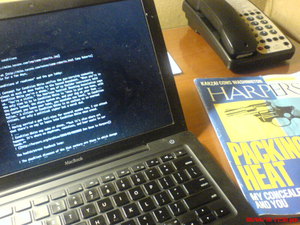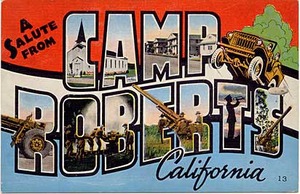tecznotes
Michal Migurski's notebook, listening post, and soapbox. Subscribe to ![]() this blog.
Check out the rest of my site as well.
this blog.
Check out the rest of my site as well.
Aug 5, 2010 7:05am
stress conditions

I'm at Camp Roberts again for a few days, working on Walking Papers with friends from STAR-TIDES, FortiusOne, Google, and Gonzo Earth on open source, geographic crisis response technology. Being in a military environment working on responses to high-speed disaster has me thinking about stress and preparedness. Two excellent magazine articles on the subject crossed my path recently, both forming a cohesive view on the privilege of living without stress. Privilege is driving a smooth road and not even knowing it, and access to that road is contested. Some are born on it, some never reach it, some resent its existence, and some can't shake the memory of the ditch alongside.
Packing Heat, "conditions of readiness," and the gun lobby:
Contempt for Condition White unifies the gun-carrying community almost as much as does fealty to the Second Amendment. "When you're in Condition White you're a sheep," one of my Boulder instructors told us. "You're a victim." The American Tactical Shooting Association says the only time to be in Condition White is "when in your own home, with the doors locked, the alarm system on, and your dog at your feet ... the instant you leave your home, you escalate one level, to Condition Yellow." A citizen in Condition White is as useless as an unarmed citizen, not only a political cipher but a moral dud. ... Having carried a gun full-time for several months now, I can attest that there's no way to lapse into Condition White when armed. ... Condition White may make us sheep, but it's also where art happens. It's where we daydream, reminisce, and hear music in our heads. (Dan Baum in Harpers, sorry for the paywall)
Under Pressure, chemistry, and health/stress feedback loops:
The deadliest diseases of the 21st century are those in which damage accumulates steadily over time. (Sapolsky refers to this as the "luxury of slowly falling apart.") Unfortunately, this is precisely the sort of damage that’s exacerbated by emotional stress. ... One of the most tragic aspects of the stress response is the way it gets hardwired at a young age - an early setback can permanently alter the way we deal with future stressors. The biological logic of this system is impeccable: If the world is a rough and scary place, then the brain assumes it should invest more in our stress machinery, which will make us extremely wary and alert. There's also a positive feedback loop at work, so that chronic stress actually makes us more sensitive to the effects of stress. (Jonah Lehrer in Wired)

Comments
Sorry, no new comments on old posts.